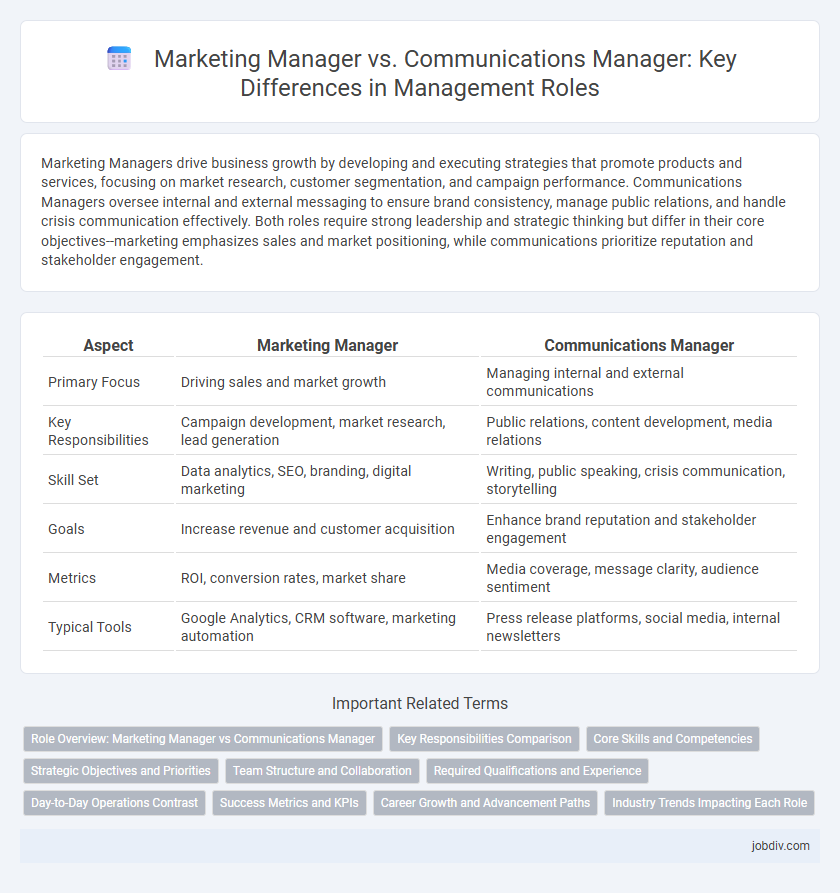Marketing Managers drive business growth by developing and executing strategies that promote products and services, focusing on market research, customer segmentation, and campaign performance. Communications Managers oversee internal and external messaging to ensure brand consistency, manage public relations, and handle crisis communication effectively. Both roles require strong leadership and strategic thinking but differ in their core objectives--marketing emphasizes sales and market positioning, while communications prioritize reputation and stakeholder engagement.
Table of Comparison
| Aspect | Marketing Manager | Communications Manager |
|---|---|---|
| Primary Focus | Driving sales and market growth | Managing internal and external communications |
| Key Responsibilities | Campaign development, market research, lead generation | Public relations, content development, media relations |
| Skill Set | Data analytics, SEO, branding, digital marketing | Writing, public speaking, crisis communication, storytelling |
| Goals | Increase revenue and customer acquisition | Enhance brand reputation and stakeholder engagement |
| Metrics | ROI, conversion rates, market share | Media coverage, message clarity, audience sentiment |
| Typical Tools | Google Analytics, CRM software, marketing automation | Press release platforms, social media, internal newsletters |
Role Overview: Marketing Manager vs Communications Manager
Marketing Managers develop strategic campaigns focused on market analysis, customer segmentation, and product promotion to drive sales and brand growth. Communications Managers oversee internal and external messaging, brand reputation, and media relations to ensure consistent and effective organizational communication. Both roles require collaboration with cross-functional teams but differ in their primary objectives, with Marketing emphasizing market-driven growth and Communications centered on stakeholder engagement and information clarity.
Key Responsibilities Comparison
Marketing Managers develop and execute strategic marketing campaigns to drive brand awareness, customer acquisition, and revenue growth, focusing on market research, product positioning, and advertising. Communications Managers oversee internal and external communications, manage public relations, and handle corporate messaging to maintain brand reputation and stakeholder engagement. Both roles require collaboration but differ as Marketing Managers prioritize market-driven strategies, while Communications Managers concentrate on message consistency and relationship management.
Core Skills and Competencies
Marketing Managers excel in market research, data analysis, and campaign strategy, leveraging skills in digital marketing, SEO, and brand positioning to drive customer acquisition and revenue growth. Communications Managers specialize in media relations, corporate communications, and crisis management, emphasizing skills in public speaking, content creation, and stakeholder engagement for maintaining brand reputation. Both roles require strong leadership, strategic thinking, and proficiency in communication but differ in focus areas: Marketing Managers prioritize market trends and consumer behavior, while Communications Managers concentrate on internal/external messaging and public perception.
Strategic Objectives and Priorities
A Marketing Manager concentrates on driving revenue growth through targeted campaigns, market research, and customer segmentation to achieve strategic objectives such as brand positioning and market share expansion. A Communications Manager prioritizes shaping corporate reputation, managing internal and external messaging, and crisis communication to align with organizational values and stakeholder engagement goals. Both roles demand collaboration but differ in focus: marketing targets market-driven growth metrics, while communications emphasizes narrative control and relationship management.
Team Structure and Collaboration
Marketing Managers typically lead cross-functional teams including content creators, analysts, and digital marketers, focusing on campaign execution and brand growth. Communications Managers oversee PR specialists, internal communications officers, and media relations staff, ensuring consistent messaging and stakeholder engagement. Both roles require close collaboration to align marketing strategies with communication goals, fostering cohesive brand representation and effective audience outreach.
Required Qualifications and Experience
Marketing Managers typically require a bachelor's degree in marketing, business administration, or a related field, along with 3 to 5 years of experience in market research, campaign development, and digital marketing strategies. Communications Managers often hold degrees in communications, public relations, or journalism, paired with 4 to 6 years of expertise in media relations, corporate communications, and content creation. Both roles demand strong leadership, strategic planning skills, and proficiency in data analysis tools to effectively drive brand awareness and stakeholder engagement.
Day-to-Day Operations Contrast
Marketing Managers oversee campaign development, market research, and customer segmentation to boost brand visibility and sales performance. Communications Managers handle internal and external messaging, media relations, and corporate reputation management, ensuring consistent brand voice across all channels. Daily tasks for Marketing Managers prioritize strategic advertising and promotional activities, while Communications Managers focus on content creation, stakeholder engagement, and crisis communication.
Success Metrics and KPIs
Marketing Managers prioritize KPIs such as customer acquisition cost (CAC), conversion rates, return on marketing investment (ROMI), and lead generation volume to directly measure campaign effectiveness and revenue growth. Communications Managers focus on success metrics like brand awareness scores, media coverage quality, social media engagement, and sentiment analysis to evaluate public perception and internal communication impact. Both roles use unique yet complementary KPIs to drive organizational success through targeted strategy execution and stakeholder engagement.
Career Growth and Advancement Paths
Marketing Managers often advance by specializing in digital marketing strategies, brand management, or market research, leading to roles like Director of Marketing or Chief Marketing Officer. Communications Managers typically grow by expanding expertise in corporate communications, public relations, and stakeholder engagement, progressing toward positions such as Communications Director or Vice President of Communications. Both roles demand continuous skill development in analytics, leadership, and strategic planning to achieve senior management and executive career milestones.
Industry Trends Impacting Each Role
Marketing Managers increasingly leverage data analytics and artificial intelligence to drive targeted campaigns and optimize customer engagement, reflecting the industry's shift towards personalization and digital transformation. Communications Managers face growing demand for crisis communication skills and reputation management amid rising social media influence and real-time information dissemination. Both roles must adapt to omnichannel strategies and evolving consumer behaviors shaped by technological advancements and global market dynamics.
Marketing Manager vs Communications Manager Infographic

 jobdiv.com
jobdiv.com